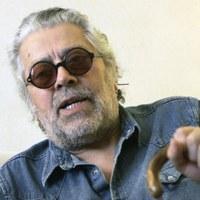La Plata (Argentina), 1937 – Cidade da Guatemala (Guatemala), 2011
By Fernanda Gdynia Morotti
Singer and poet who became an icon of Argentine music.
Born Rodolfo Enrique Cabral, at nine years old he ran away from home with a plan: to find President Juan Domingo Perón and ask for a job for himself and his mother, as they lived in extreme poverty. He slept on the streets for days until he reached the Casa Rosada, the government headquarters in Buenos Aires. Taking advantage of a public event with Perón present, he managed to break through security and be heard by the president. The unusual request resulted in a job for Facundo’s mother and his older brother. At fourteen, uneducated, an alcoholic, and living on the margins, he was sent to a reformatory. There he remained under the protection of a Jesuit priest, who taught him to read and write, and introduced him to world literature, philosophy, and religion.
After leaving the reformatory, he began his artistic career, playing guitar, singing folk songs, and composing. His first stage name was El Índio Gasparino, which he soon changed to Facundo Cabral.
During the dictatorship, he was persecuted for being considered a “protest singer” and went into exile in Mexico. He performed numerous shows throughout Spanish America, and when he returned to Argentina in 1984, he was an established artist. His performances combined music, humor, and poetry. A pacifist and free thinker, he preached social tolerance. In 2006, he was named UNESCO World Messenger of Peace and, in 2008, nominated for the Nobel Peace Prize.
In July 2011, after performing a show in Guatemala City, Facundo accepted a ride from Henry Fariñas, a local businessman, to the airport. On the way, the car they were in was ambushed and hit by 25 bullets. Three of them killed the singer. He was 74 years old. The attack is believed to have been ordered by enemies of the businessman linked to drug trafficking.



